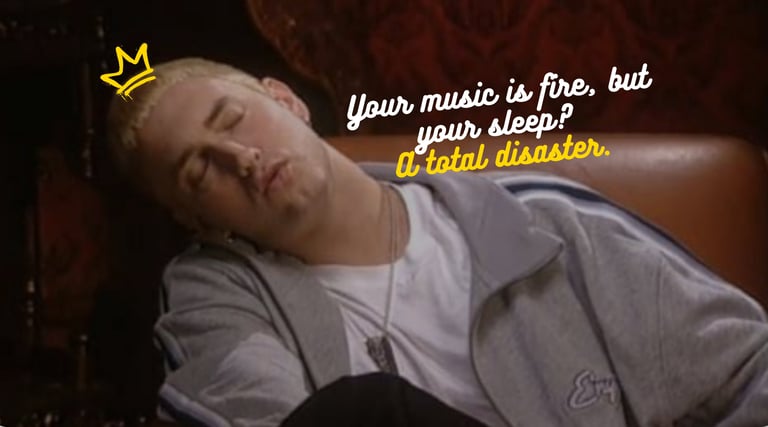The DJ & Artist’s Guide to Sleep Hygiene
Late nights and high-energy sets can wreck your sleep—but they don’t have to. This guide breaks down simple, effective ways DJs can improve sleep quality, recover faster, and boost energy, even with an unconventional schedule. Learn how to build a wind-down routine, manage light exposure, and use tech to support better rest—so you can keep performing at your best.
SLEEP
dj miss kittie
5/8/20243 min read


Late nights and high-energy performances are part of the DJ lifestyle, but they can take a toll on your sleep and overall health. Optimizing your sleep hygiene—the habits and environment that influence your quality of rest—can make a world of difference. Here’s how to create a solid sleep routine, even with an unconventional schedule.
Why Sleep Hygiene Matters for DJs
As a DJ, your schedule likely includes late nights, flashing stage lights, and the adrenaline rush of performing. These factors can disrupt your circadian rhythm, making it harder to fall asleep and recover. Poor sleep can lead to fatigue, impaired focus, and even long-term health issues like heart problems or weakened immunity. By improving your sleep hygiene, you can:
Recover faster after gigs.
Maintain better energy levels.
Enhance mental clarity and creativity.
Improve your overall health and performance.
Tips to Optimize Your Sleep Hygiene
1. Create a Post-Performance Wind-Down Routine
After a show, your adrenaline is still pumping, making it hard to transition into relaxation mode. Build a consistent wind-down routine to signal to your body that it’s time to rest. Ideas include:
Taking a warm shower or bath.
Practicing light stretching or yoga.
Journaling to clear your mind of lingering thoughts.
Using calming scents like lavender essential oil.
2. Control Your Sleep Environment
Your bedroom should be a sanctuary for rest. Consider these adjustments:
Use blackout curtains to block out sunlight if you’re sleeping during the day.
Keep the room cool, ideally between 60-67°F (15-19°C).
Use white noise machines or earplugs to block out distracting sounds.
Invest in a comfortable mattress and pillows that support your sleep posture.
3. Manage Light Exposure
Bright stage lights and screens can suppress melatonin production, making it harder to fall asleep. Here’s what you can do:
Wear blue-light-blocking glasses after shows to minimize screen exposure.
Dim the lights in your living space when you get home.
Try red or amber light bulbs, which are less disruptive to melatonin production.
4. Time Your Meals Wisely
Late-night gigs often lead to late-night eating, but heavy meals before bed can disrupt sleep. Instead:
Eat a balanced, lighter meal post-show, focusing on easy-to-digest proteins and complex carbs.
Avoid caffeine and alcohol within 4-6 hours of your intended bedtime.
Stay hydrated but avoid drinking too much water right before sleep to minimize bathroom interruptions.
5. Set a Flexible Sleep Schedule
While consistency is ideal, the nightlife industry isn’t always predictable. Aim for the following:
Block out a specific sleep window each day, even if it’s unconventional (e.g., 4 a.m. to 11 a.m.).
Allow yourself short naps (20-30 minutes) if you can’t get a full night’s rest.
6. Use Relaxation Techniques
Incorporate mindfulness practices to calm your mind after an intense night. Options include:
Deep breathing exercises (e.g., inhale for 4 seconds, hold for 7 seconds, exhale for 8 seconds).
Guided meditation apps like Calm or Headspace.
Progressive muscle relaxation to release tension from your body.
7. Be Mindful of Substances
Alcohol, caffeine, and nicotine can interfere with sleep quality. Here’s how to manage:
Limit caffeine intake to early in your day to avoid lingering effects.
Drink alcohol in moderation, as it disrupts REM sleep.
Avoid nicotine before bed, as it acts as a stimulant.
Bonus: Tech Tools for Better Sleep
Technology can also help you optimize your rest. Consider these gadgets:
Wearables like Oura Ring or WHOOP to track sleep patterns and recovery.
Smart lights that gradually dim or change color to mimic natural sunset cues.
Sleep apps for white noise, guided meditations, or tracking your habits.
The Payoff of Prioritizing Sleep
Better sleep hygiene doesn’t just help you recover—it also enhances your performance as a DJ. With more energy, focus, and creativity, you’ll be better equipped to rock the stage, produce fresh tracks, and sustain your career long-term. Start implementing these tips today, and let your body and mind reap the rewards.
